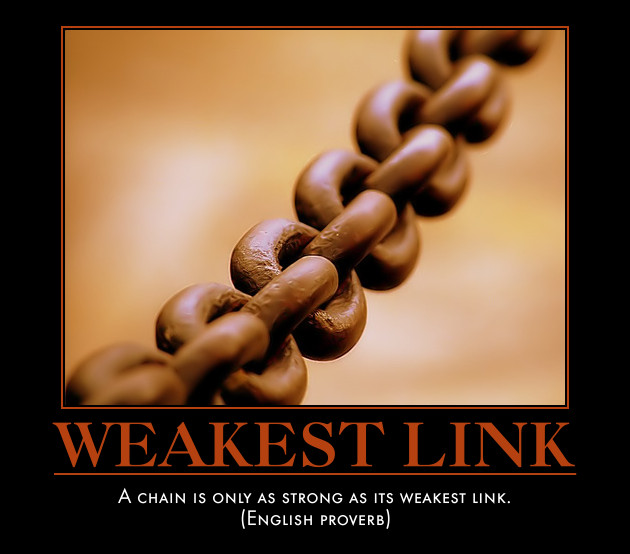“The strength of the team is impacted by its weakest link.”
–John Maxwell
I coached a leader some time back who had a challenge with a team member that wasn’t showing up for work. Jack (not his real name) always had, what seemed like, sound excuses for his absences. When Jack did come to work, his work was not up to the standard of the organization. When Jack didn’t show up, everyone else had to cover for him. When he left work assignments undone, someone would have to finish the work for him. Jack was the weak link on this team, and to make matters worse, he was a friend of the leader.
I explained the Law of the Chain from John Maxwell’s book, “The 17 Indisputable Laws of Teamwork.” The power and momentum of a team may be able to compensate for a weak link in the short term, but not forever. Eventually, weak links will pull the entire team down to their level. The stronger members of the team always recognize the weaker member. They have to help the weaker members otherwise the team suffers. No one likes to fall behind consistently because of the same person. This often results in resentment. A team cannot reach its full potential when it has a wask link.
Team leaders can try to help the weaker team members grow, but often weak links don’t see their limitations, which was true in this case. Jack was blind to the negative impact he was having on the team.
How do you recognize people who fall into this category?

1. They can’t keep pace with other team members.
2. They don’t grow in their area of responsibility.
3. They don’t see the big picture.
4. They won’t work on personal weaknesses.
5. They won’t work with the rest of the team.
6. They can’t fulfill expectations for their area.
The leader has two choices when a weak link is identified: Train them or trade them. Trading a team member is not easy, especially if the person is a friend. These weaker team members may not necessarily be bad people. They may thrive and be a great addition to another team! If you do trade them, the trade may be something that they thank you for later on. The rest of the team will thank you when that trade is made, as well.
As parents, we can’t trade our children, although at times, we may feel like that’s what we want.:) The above list can help you determine if they are strong members of your family teams. We can train them to grow into strong team members and eventually great leaders. I believe we would all like to raise our children to be leaders rather than followers.
Look at the identifying list above. How are we doing? We all have blind spots and it may be that we recognize one or two of these characteristics in ourselves. Maybe ask a trusted colleague if they can spot any of these traits in us. I know, that’s not an easy thing to do, is it? If we discover any of these in ourselves, we need to get on a growth plan. We are responsible for our own growth so we don’t hold our teams back.
Go and grow,
Jan
Jan McDonald
The John Maxwell Team
Follow me on facebook for more leadership tips @janmariemcdonald
For a friend to subscribe, here is the link
https://tinyurl.com/janmcdonald
www.johncmaxwellgroup.com/janmcdonald
https://www.linkedin.com/in/janmmcdonald

Comments are closed.